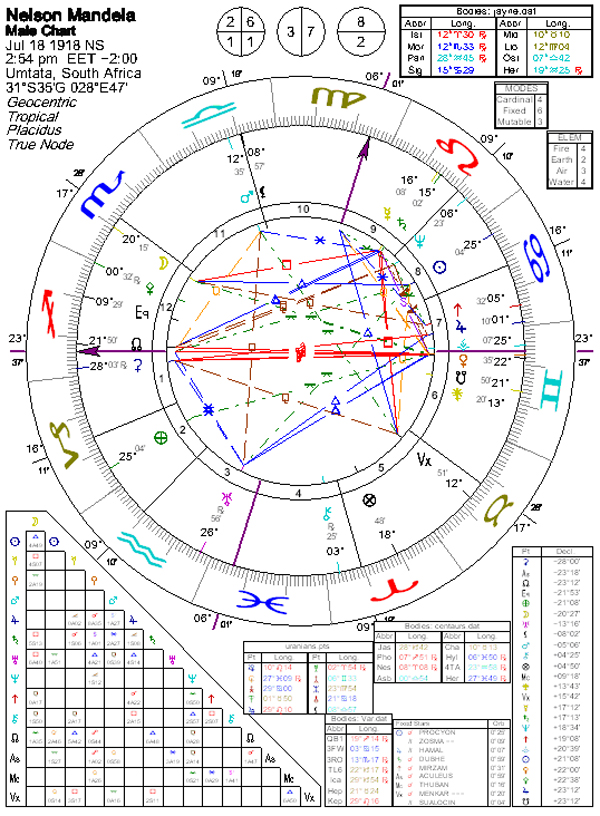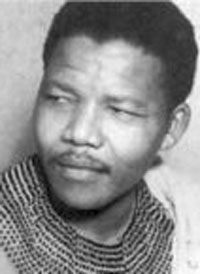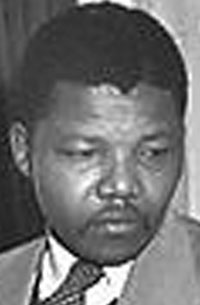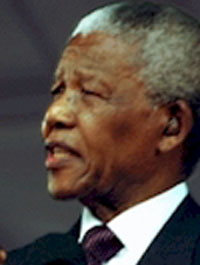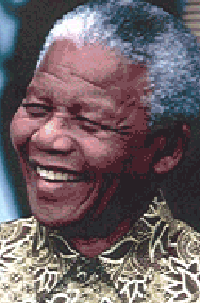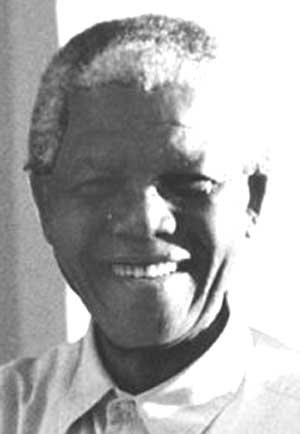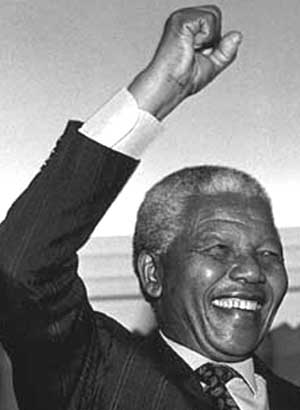Copyright Michael D. Robbins 2005
Astro-Rayological
Interpretation & Charts
Quotes
Images
and Physiognomic Interpretation
Nelson Mandela—Statesman, President of South Africa: June 18, 1918, Umtata, South Africa, 2:54 PM, EET. (Source: According to LMT, reported as in the afternoon by Mandela and exhaustively rectified by Noel Tyl)
Ascendant, Sagittarius; Sun in Cancer with Jupiter conjunct Pluto also in Cancer; Moon in Scorpio; Mercury conjunct Saturn in Leo square the Moon in H12, with Neptune also in Leo; Venus in Gemini; Mars in Libra; Uranus in Aquarius. Humanity knows Nelson Mandela as a great liberator—one of the best examples of the first and second rays in combination. It is reasonable to think of the first ray as his soul ray and the second as the ray of his personality. In a way, he stands as the “Father of his Country”, with the Sun in Cancer indicating his patriotism and the Jupiter conjunct Pluto in Cancer, the political fulfillment he brought to his people and the sacrifices (Pluto) endured.
Under house arrest for almost one complete Saturn cycle (an experience indicated by his Scorpio Moon in the house of imprisonment, H12, squared by his Saturn/Mercury conjunction—he was imprisoned for his thought and speech—he persisted with his vision (Sagittarius) of a free South Africa, and eventually, through will and occult strength, persisted until his meditations became realities. He stands as a supreme example of the power of non-violent revolution (second ray), and of soul power (Venus) expressed through thought and word (Gemini).
The freedom he won is indicated by first and seventh ray Uranus in Aquarius, the sign of revolution. It is interesting to contemplate that his Ascendant is, according to the data available, the same as that of Abraham Lincoln, and his soul and personality rays are probably the same as well.
Education is the most powerful weapon which you can use to change the world.
(North Node in Sagittarius conjunct Ascendant. Mercury & Saturn in 9th house.)
For to be free is not merely to cast off one's chains, but to live in a way that respects and enhances the freedom of others.
I cannot conceive of Israel withdrawing if Arab states do not recognize Israel, within secure borders.
I dream of the realization of the unity of Africa, whereby its leaders combine in their efforts to solve the problems of this continent. I dream of our vast deserts, of our forests, of all our great wildernesses.
(Sun in Cancer)
I learned that courage was not the absence of fear, but the triumph over it. The brave man is not he who does not feel afraid, but he who conquers that fear.
(Sun in Cancer trine Moon in Scorpio. Mars in Libra.)
If the United States of America or Britain is having elections, they don't ask for observers from Africa or from Asia. But when we have elections, they want observers.
If there are dreams about a beautiful South Africa, there are also roads that lead to their goal. Two of these roads could be named Goodness and Forgiveness.
If you talk to a man in a language he understands, that goes to his head. If you talk to him in his language, that goes to his heart.
(Mercury in Leo in 9th house.)
If you want to make peace with your enemy, you have to work with your enemy. Then he becomes your partner.
In my country we go to prison first and then become President.
(Moon in 12th house square Saturn)
Let freedom reign. The sun never set on so glorious a human achievement.
(Uranus in Aquarius)
Let there be work, bread, water and salt for all.
(Sun in Cancer)
Money won't create success, the freedom to make it will.
Never, never and never again shall it be that this beautiful land will again experience the oppression of one by another.
Only free men can negotiate; prisoners cannot enter into contracts. Your freedom and mine cannot be separated.
The greatest glory in living lies not in never falling, but in rising every time we fall.
There can be no keener revelation of a society's soul than the way in which it treats its children.
There is no easy walk to freedom anywhere, and many of us will have to pass through the valley of the shadow of death again and again before we reach the mountaintop of our desires.
There is nothing like returning to a place that remains unchanged to find the ways in which you yourself have altered.
We must use time wisely and forever realize that the time is always ripe to do right.
When the water starts boiling it is foolish to turn off the heat.
After climbing a great hill, one only finds that there are many more hills to climb. I have taken a moment here to rest, to steal a view of the glorious vista that surrounds me, to look back on the distance I have come. But I can rest only for a moment, for with freedom comes responsibilities, and I dare not linger, for my long walk is not yet ended.
“It is better to lead from behind and to put others in front, especially when you celebrate victory when nice things occur. You take the front line when there is danger. Then people will appreciate your leadership.”
(Saturn, Mercury & Neptune in Leo)
“As we are liberated from our own fear, our presence automatically liberates others.”
“As a leader... I have always endeavored to listen to what each and every person in a discussion had to say before venturing my own opinion. Oftentimes, my own opinion will simply represent a con-sensus of what I heard in the discussion. I always remember the axiom: a leader is like a shepherd. He stays behind the flock, letting the most nimble go out ahead, whereupon the others follow, not realizing that all along they are being directed from behind.”
“Education is the great engine of personal development. It is through education that the daughter of a peasant can become a doctor, that a son of a mineworker can become the head of the mine, that a child of farm workers can become the president of a nation.”
“I have walked that long road to freedom. I have tried not to falter; I have made missteps along the way. But I have discovered the secret that after climbing a great hill, one only finds that there are many more hills to climb.”
“For to be free is not merely to cast off one's chains, but to live in a way that respects and enhances the freedom of others.”
“It is said that no-one truly knows a nation until one has been inside its jails. A nation should not be judged by how it treats its highest citizens, but its lowest ones.”
“Does anybody really think that they didn't get what they had because they didn't have the talent or the strength or the endurance or the commitment?”
“That was one of the things that worried me - to be raised to the position of a semi-god - because then you are no longer a human being. I wanted to be known as Mandela, a man with weaknesses, some of which are fundamental, and a man who is committed…”
“Let freedom reign. The sun never set on so glorious a human achievement.”
“There is no such thing as part freedom”
“I detest racialism, because I regard it as a barbaric thing, whether it comes from a black man or a white man”
“We need to exert ourselves that much more, and break out of the vicious cycle of dependence imposed on us by the financially powerful: those in command of immense market power and those who dare to fashion the world in their own image”
“The curious beauty of African music is that it uplifts even as it tells a sad tale. You may be poor, you may have only a ramshackle house, you may have lost your job, but that song gives you hope.”
“When I think about the past, the types of things they did, I feel angry, but then again that is my feeling. The brain always dominates, says, as I have pointed out, you have a limited time to stay on Earth. You must try and use that period to transform...”
“How can I be expected to believe that this same racial discrimination which has been the cause of so much injustice and suffering right through the years, should now operate here to give me a fair and open trial?....consider myself neither morally nor legally obliged to obey laws made by a Parliament in which I am not represented. That the will of the people is the basis of the authority of government, is a principle universally acknowledged as sacred throughout the civilized world.”
(Mars in Libra in 11th house)
“The time comes in the life of any nation when there remains only two choices - submit or fight. That time has now come to South Africa. We shall not submit and we have no choice but to hit back by all means in our power in defense of our people.”
“This is one of the most important moments in the life of our country. I stand here before you filled with deep pride and joy - pride in the ordinary, humble people of this country.”
“Whatever the sentence Your Worship sees fit to impose upon me for the crime for which I have been convicted before this court may it rest assured that when my sentence has been completed, I will still be moved as men are always moved, by their conscience.”
“Today the majority of South Africans, black and white, recognize that apartheid has no future. It has to be ended by our own decisive mass action in order to build peace and security.”
“I cherish my own freedom dearly, but I care even more for your freedom. Too many have died since I went to prison. Too many have suffered for the love of freedom. I owe it to their widows, to their orphans, to their mothers and their fathers…”
“I have never cared very much for personal prizes. A man does not become a freedom fighter in the hope of winning awards, but when I was notified that I had won the 1993 Nobel Peace Prize jointly with Mr de Klerk, I was deeply moved.”
“I regard it as a duty which I owed, not just to my people, but also to my profession, to the practice of law, and to the justice for all mankind, to cry out against this discrimination which is essentially unjust and opposed to the whole basis of the attitude towards justice which is part of the tradition of legal training in this country. I believed that in taking up a stand against this injustice I was upholding the dignity of what should be an honorable profession.”
“It is, however, well known that the main national liberation organizations in this country have consistently followed a policy of non-violence. They have conducted themselves peaceably at all times, regardless of government attacks and persecutions…”
“During my lifetime I have dedicated myself to this struggle of the African people, I have fought against white domination, and I have fought against black domination. I have cherished the ideal of a democratic and free society…”
“Of all the observations I have made on the strike, none has brought forth so much heat and emotion as the stress and emphasis we put on non- violence.”
“I hate racial discrimination most intensely and all its manifestations. I have fought all my life; I fight now, and will do so until the end of my days. Even although I now happen to be tried by one, whose opinion I hold in high esteem, I detest most violently the set-up that surrounds me here. It makes me feel that I am a Black man in a White man's court. This should not be I should feel perfectly at ease and at home with the assurance that I am being tried by a fellow South African, who does not regard me as an inferior, entitled to a special type of justice.”
“The government has interpreted the peacefulness of the movement as a weakness: the people's non-violent policies have been taken as a green light for government violence.”
“There was much in such a society that was primitive and insecure and it certainly could never measure up to the demands of the present epoch. But in such a society are contained the seeds of revolutionary democracy in which none will be held in slavery.”
“A good head and good heart are always a formidable combination. But when you add to that a literate tongue or pen, then you have something very special.”
“Everything before then was written off as savagery or barbarism. Any story that involved heroism was about white people,”
“Those South Africans who berate me for being loyal to our friends, literally they can go and throw themselves into a pool. I am not going to betray the trust of those who helped us.”
A Brief Biography
Mandela's words, "The struggle is my life," are not to be taken lightly.
Nelson Mandela personifies struggle. He is still leading the fight against apartheid with extraordinary vigour and resilience after spending nearly three decades of his life behind bars. He has sacrificed his private life and his youth for his people, and remains South Africa's best known and loved hero.
Mandela has held numerous positions in the ANC: ANCYL secretary (1948); ANCYL president (1950); ANC Transvaal president (1952); deputy national president (1952) and ANC president (1991).
He was born at Qunu, near Umtata on 18 July 1918.
His father, Henry Mgadla Mandela, was chief councillor to Thembuland's acting paramount chief David Dalindyebo. When his father died, Mandela became the chief's ward and was groomed for the chieftainship.
Mandela matriculated at Healdtown Methodist Boarding School and then started a BA degree at Fort Hare. As an SRC member he participated in a student strike and was expelled, along with the late Oliver Tambo, in 1940. He completed his degree by correspondence from Johannesburg, did articles of clerkship and enrolled for an LLB at the University of the Witwatersrand.
In 1944 he helped found the ANC Youth League, whose Programme of Action was adopted by the ANC in 1949.
Mandela was elected national volunteer-in-chief of the 1952 Defiance Campaign. He travelled the country organising resistance to discriminatory legislation.
He was given a suspended sentence for his part in the campaign. Shortly afterwards a banning order confined him to Johannesburg for six months. During this period he formulated the "M Plan", in terms of which ANC branches were broken down into underground cells.
By 1952 Mandela and Tambo had opened the first black legal firm in the country, and Mandela was both Transvaal president of the ANC and deputy national president.
A petition by the Transvaal Law Society to strike Mandela off the roll of attorneys was refused by the Supreme Court.
In the 'fifties, after being forced through constant bannings to resign officially from the ANC, Mandela analysed the Bantustan policy as a political swindle. He predicted mass removals, political persecutions and police terror.
For the second half of the 'fifties, he was one of the accused in the Treason Trial. With Duma Nokwe, he conducted the defence.
When the ANC was banned after the Sharpeville massacre in 1960, he was detained until 1961 when he went underground to lead a campaign for a new national convention.
Umkhonto we Sizwe (MK), the military wing of the ANC, was born the same year. Under his leadership it launched a campaign of sabotage against government and economic installations.
In 1962 Mandela left the country for military training in Algeria and to arrange training for other MK members.
On his return he was arrested for leaving the country illegally and for incitement to strike. He conducted his own defence. He was convicted and jailed for five years in November 1962. While serving his sentence, he was charged, in the Rivonia trial, with sabotage and sentenced to life imprisonment.
A decade before being imprisoned, Mandela had spoken out against the introduction of Bantu Education, recommending that community activists "make every home, every shack or rickety structure a centre of learning".
Robben Island, where he was imprisoned, became a centre for learning, and Mandela was a central figure in the organised political education classes.
In prison Mandela never compromised his political principles and was always a source of strength for the other prisoners.
During the 'seventies he refused the offer of a remission of sentence if he recognised Transkei and settled there.
In the 'eighties he again rejected PW Botha's offer of freedom if he renounced violence.
It is significant that shortly after his release on Sunday 11 February 1990, Mandela and his delegation agreed to the suspension of armed struggle.
Mandela has honorary degrees from more than 50 international universities and is chancellor of the University of the North.
He was inaugurated as the first democratically elected State President of South Africa on 10 May 1994 - June 1999
Nelson Mandela retired from Public life in June 1999. He currently resides in his birth place - Qunu, Transkei.
